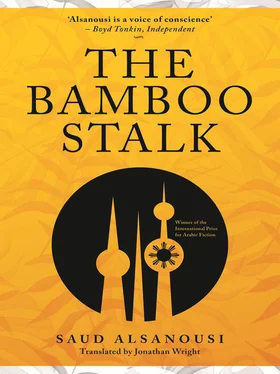I must have looked like a wax sculpture, expressionless and immobile except for my eyes, which looked from one to the other in scorn. My god, they were trying to corner me into doing what suited them.
‘The right place for you is there, in the Philippines.’
I stood up. They looked up at me as I made a move to leave the sitting room.
‘Where are you going?’ Nouriya asked.
‘Just a minute,’ I said. I came back carrying my briefcase of photographs and documents. I sat down opposite them. I took out my blue passport and my black certificate of nationality from the briefcase. I waved them in the air. ‘I’m Kuwaiti,’ I said.
With irritating composure they shook their heads. Nouriya looked right through me and said, ‘You’re illegitimate.’
An electric shock ran up my spine like lightning, all the way to my head.
‘You are a believer,’ Awatif said.
I put my hand in the briefcase and pulled out a picture of my father. My arm shaking with anger, I waved it in front of them. ‘I’m the son of this man,’ I said.
Their confidence threw me off balance. Nouriya was trying to disarm me with her look. Awatif shook her head and smiled sadly.
‘I’m Isa Rashid al-Tarouf,’ I said.
‘Rashid isn’t your father,’ Awatif said with the same smile. ‘You’ve no right to claim him as your father or use his name.’ Her self-confidence seemed to be slipping. ‘You’re a believer,’ she added, reminding me. ‘Illegitimate children take their mother’s name.’
Nouriya cut in. ‘Yes, on that basis, you’re Isa Josephine.’
What a lot of names I have! It’s time to settle on just one of them. I put my hand in my briefcase looking for the papers. My right hand took hold of a folded piece of paper. I opened it out. I knew it from the signatures of Walid and Ghassan.
Nouriya took the initiative. ‘I expect you’re going to show me the marriage certificate of Rashid and Josephine. Don’t bother. Even if you are Rashid’s son under Kuwaiti law, you’re not his son by Islamic law,’ she said.
Awatif joined in. ‘You are a believer,’ she said.
I ignored her remark and looked defiantly into Nouriya’s eyes. I let her finish off what she wanted to say. ‘I think you know that your mother,’ she stopped and rephrased it, ‘that our maid Josephine was pregnant with you before this piece of paper was written, that is before the marriage.’ I let her continue as I looked through the papers. ‘Listen, Josephine’s son, you don’t have the right to use our name. You don’t have any inheritance rights. Under Islamic law that wouldn’t be allowed. And yet you insist on staying. Don’t you have any dignity?’ Nouriya said.
‘Or faith?’ added Awatif.
I found the document I wanted. The marriage certificate was still in my right hand. ‘You’re right, Aunt Nouriya,’ I said. I emphasised the word ‘aunt’ to stress the relationship that existed whether she liked it or not. ‘My mother did get pregnant several months before this document was written,’ I said, waving the marriage certificate signed by Walid and Ghassan. ‘But a few hours after this document was written,’ I added, waving another piece of paper in my left hand.
They looked at each other sceptically. With a confidence that she was trying her hardest to sustain, Nouriya said, ‘What is that document?’
‘This is a certificate of what they call common-law marriage,’ I said, with the same composed smile as Awatif.
Nouriya exploded. She threatened, she menaced, she cursed, she snarled, she issued warnings in Arabic, in English and with hand gestures. Awatif took refuge in silence with a face that fluctuated between shock and sadness.
Nouriya left my flat a defeated shark. Awatif covered her head with her black abaya. At the front door, before I closed it, she turned to me in tears. ‘Oh God,’ she said. ‘Oh God, I’m sorry.’ She wiped her face with part of her abaya and said, ‘You are Kuwaiti. You’re my nephew, Rashid’s son.’
From the open lift Nouriya called her impatiently: ‘Awatif!’
‘Forgive me. God forgive me,’ Awatif added, before joining her sister.
I faked a smile and said, ‘You are a believer’ and closed the door.
16
I didn’t tell Jabir what trouble he had caused me by telling his mother about me. I was angry with him but I suppressed my anger and didn’t tell him anything. I wasn’t so crazy as to lose one of the crazies.
One evening Jabir and I were in the diwaniya while the others were out at an election meeting for Hind al-Tarouf, my aunt. The crazies were keen she should win, except for Abdullah, who didn’t want a woman to represent him in parliament. ‘Doesn’t Kuwait have any men left?’ was his view. He didn’t say that in front of me but Jabir told me about his attitude. ‘Abdullah thinks women can serve society in positions other than in parliament,’ he said.
Jabir, who knew my aunt closely, spoke to me about her, her election programme, her vision for the future of Kuwait and her reputation for always standing on the side of human rights. ‘Do you expect her to win?’ I asked.
He pursed his lips and said, ‘It’s not that easy. Women have only had political rights for three years. It’s still something new. She may win in the years to come.’ His mobile phone beeped to say a text message had arrived. He picked up his phone and read it. ‘It’s Turki saying You missed quite a scene. Massive turnout for the Tarouf meeting .’ He picked up his car keys. ‘Come on then, up you get,’ he said. I shook my head. He grabbed my arm. ‘Don’t be a coward. We’ll stay in the car, man,’ he said.
* * *
Hind’s election headquarters was in Qortuba, close to the front of the religious institute on Damascus Street, not far from the relay tower on my favourite spot. I couldn’t see inside the building. There were lots of cars in the car park of the religious institute, and other cars parked on or parallel to the pavement. My aunt’s voice was coming out of loudspeakers set up in various places. She was speaking in the same tone as when I heard her in television discussions. Turki, Mishaal and Mahdi were standing at the main entrance to the hall, giving out leaflets to people as they arrived. The children of Awatif and Nouriya were also at the door with badges hanging from their necks. All I could make out on the badge was a large number 3. ‘That’s the number of the constituency,’ said Jabir.
Among the crowd outside I caught sight of Khawla wearing the same badge. I took out my mobile and called her. ‘Hello, what are you doing outside? Go into the hall,’ I said. I could see her from my place in the car.
She looked around in the crowd. ‘Where are you, you crazy? Aunt Nouriya is here!’ she said.
I put my arm out of the car window and waved to her. ‘I’m here,’ I said. She was still looking around. ‘Here, here, turn towards the street, to the right, to the right,’ I said. Jabir helped me by honking his horn three times. ‘Beep, beep, beeeeep.’
Khawla waved her hand and ran towards the car with that smile that I loved. ‘ As-salam aleekum , How are you, Isa?’ She bent down to look through the car window and looked at Jabir behind the wheel. She gave an even bigger smile. ‘How are you, Jabir?’ she asked. The tent behind her broke into applause. I had goosebumps and my heart began to pound. Involuntarily Khawla began to clap too.
‘How are things going?’ I asked her. She laced her fingers together over her chest and said, ‘If only Father were here, Isa, in the audience. He always called for women to be included in social development. I wish he could see his sister today.’ She stopped and bent down lower till her head was almost coming through the car window. She looked back and forth between me and Jabir with one eyebrow raised. ‘Our neighbour, a childhood friend, and my brother, both in the same car! How fate. .’
Читать дальше












